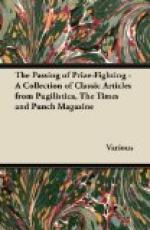The very young lady is usually prodigiously careful of her little self: she regards men as her natural enemies. Poor innocent!—This absurdity is the fault of her education. They have made her believe that love is the most abominable, execrable, infernal thing in existence. They have taught her to lie and to dissimulate her most innocent emotions. But the time is not far distant when the natural impulses of her heart will break down the barriers that hypocrisy has placed around her. Woman was formed to love: she must obey the imperious law of her being, and will love the moment her inspirations for the belle passion become stronger than her reason. I may add, also, that when a young lady discovers a tendency this way, it may be safely conjectured the object on which she will bestow her favour is not very distant.
THE AUTHOR’S DIVISION OF HIS SYSTEM.
It has been a long-established axiom that there is but one great principle of love; but then it assumes various phases, according to the thousands of circumstances under which it is exhibited, and which, to speak in the language of philosophy, it would be impossible to synthetise. Time, place, age, the very season of the year, the ruling passion, peace or war, education, the instincts of the heart, the health of the body and the mind (if it be possible for the latter to be in a sane state when we fall in love), the buoyancy of youth or the decrepitude of old age,—these, and numerous other causes which I cannot at present enumerate, serve to modify to infinity the form and character of the sentiment. Thus we do not love at eighteen as we do at forty, nor in the city as we do in the country, nor in spring as we do in autumn, nor in the camp as we do in the court; nor does the ignorant man love like a learned one; the merchant does not love like the lawyer; nor does the latter love like the doctor. It is upon these different phases in the character of love that I have founded my system. Next week I shall endeavour to describe some of the traits which distinguish “The Lover.” Till then, fair readers,—I remain your devoted slave.
WITNESS MY
[Illustration: HAND AND SEAL.]
[Illustration: Alph. Lecourt]
* * * * *
GRANT’S MEDITATIONS AMONG THE COFFEE-CUPS.
We had long considered ourselves the funniest dogs in Christendee; and, in the plenitude of our vanity, imagined that we monopolised the attention and admiration of the present and the future. We expected to be deified, and thus become the founders of a new mythology. PUNCH must be immortal! But how shorn of his pristine splendour—how denuded of his fancied glories! for the John Bull has discovered—
GRANT’S LIGHTS AND SHADOWS OF LONDON LIFE.




